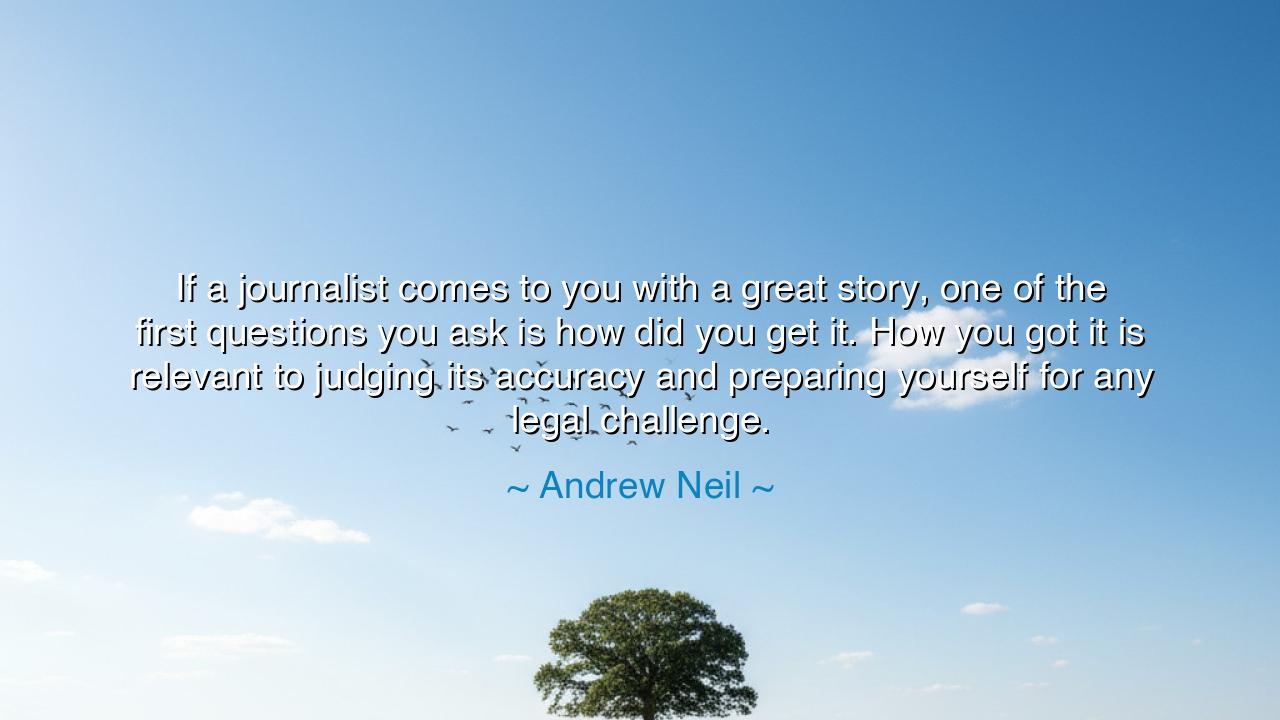
If a journalist comes to you with a great story, one of the first
If a journalist comes to you with a great story, one of the first questions you ask is how did you get it. How you got it is relevant to judging its accuracy and preparing yourself for any legal challenge.






“If a journalist comes to you with a great story, one of the first questions you ask is how did you get it. How you got it is relevant to judging its accuracy and preparing yourself for any legal challenge.” Thus spoke Andrew Neil, the seasoned chronicler of truth and power, whose words carry the gravity of long experience in the realm of journalism. His insight reaches beyond the newsroom—it speaks to the very heart of truth itself, to the eternal struggle between knowledge and integrity. For in these words, Neil reminds us that truth, however dazzling, must always be tempered by method, and that the path to discovery is as important as the discovery itself.
Andrew Neil, a figure of formidable intellect and discipline in British journalism, spoke from the vantage of a man who had seen both the glory and the ruin of the press. As editor of major newspapers and host of hard-edged political programs, he understood that in the pursuit of truth, means and ends are entwined. A story may burn brightly, but if it is born of deceit, theft, or distortion, its light blinds rather than illuminates. Thus, when a journalist presents a tale too grand, too perfect, too shocking, Neil advises the wise to pause and ask, “How did you get it?” For the foundation of every story is not its sensation, but its source—and if the foundation is rotten, the truth will crumble beneath the weight of scrutiny.
In the age of the ancients, the philosophers spoke similarly of truth. Aristotle taught that the pursuit of wisdom must be guided by ethos—the moral character of the seeker. To know the truth is not enough; one must seek it rightly. For knowledge gained through dishonor corrupts the spirit of inquiry itself. So too, in Neil’s world of journalism, the question of provenance—of how knowledge is obtained—marks the boundary between revelation and manipulation. A reporter who bends the rules may uncover great secrets, but without integrity, the truth becomes tainted. The wise editor, therefore, must weigh not only what is said, but how it was found.
Consider the story of the News International phone-hacking scandal in Britain, a cautionary tale from Neil’s own nation. Reporters, desperate for exclusives, crossed ethical lines by illegally accessing private communications. The stories they produced were sensational, their headlines explosive—but when the methods were exposed, the empire of journalism that had once seemed invincible collapsed under the weight of its own corruption. Trust was shattered, victims were humiliated, and the profession itself was scarred. The lesson, like Neil’s warning, is eternal: truth cannot be built upon dishonesty, and when it is, both truth and trust are destroyed together.
Yet Neil’s wisdom extends beyond the newsroom. His words are a mirror held up to all who deal in information—politicians, scientists, citizens, and thinkers alike. In an age where rumors travel faster than reason, where emotion often outruns evidence, his call for scrutiny and accountability is a call to discipline the mind. Whether one reads a headline, hears a claim, or shares a belief, the question should always rise within: “How did you get it?” For truth without origin is a river without a source—beautiful perhaps, but impossible to trust.
Andrew Neil’s quote also reveals another layer of meaning: the law, that ancient guardian of order, stands beside truth as its protector. To ask how a story was obtained is not merely to test its accuracy, but to prepare for the legal and moral consequences of publishing it. In a world where words can wound, where information can ruin lives, every act of revelation carries responsibility. Thus, the journalist must not only uncover, but stand accountable. For freedom of the press, like all freedoms, demands integrity from those who wield it.
The lesson, then, is clear: truth must never be divorced from integrity. Seek knowledge boldly, but walk the path of honor in its pursuit. Question not only what is told to you, but how it was learned. If you are a journalist, let your craft be guided by ethics as much as by courage. If you are a reader, let your mind be discerning, not dazzled by spectacle but anchored in skepticism. For the truest power lies not in discovering secrets, but in understanding their cost.
So remember, children of the written and spoken word, the wisdom of Andrew Neil: in the quest for truth, the method is the measure of morality. Never be seduced by the glitter of revelation without first examining its source. For the truth that is stolen will not endure, and the truth that is earned will not die. In the balance of honesty and inquiry lies the strength of every civilization—and in the integrity of those who tell its stories, the light of truth will never fade.






AAdministratorAdministrator
Welcome, honored guests. Please leave a comment, we will respond soon